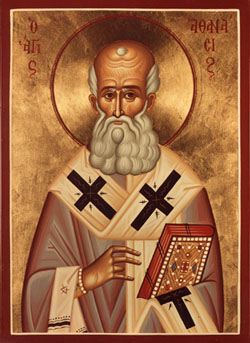Below you will find Fr. Eric Andersen's homily for
today's feast of St. Athanasius. I am pleased to say also that a Mass is
being said (by a different priest) for the intentions of Archbishop Alexander
Sample of Portland on the feast of this wonderful saint! God bless Archbishop
Sample, and may St. Athanasius help the new archbishop to have the strength and
courage he will need to confront the problems of the Archdiocese of Portland!
A homily by Fr. Eric M. Andersen, Sacred Heart in Gervais, OR
May 2nd, 2013
St. Athanasius,
bishop and doctor
There is a tradition
that St. Athanasius “first attracted the notice of Patriarch Alexander as he
was playing at baptism on the seashore with other small boys. After watching
young Athanasius perform the rite, the prelate called the boys to him and by
questioning satisfied himself that the baptisms were valid. He then undertook
to have these boys trained for the priesthood” (Vann, ed., Lives of Saints, p. 49). Athanasius was born around 297 in
Alexandria, Egypt. Alexandria was an academic center, not only because the
great Library of Alexandria was there, but also because it was a center of
Platonic thought and Theology. St. Jerome tells us that St. Mark the Evangelist
had founded the Catechetical School of Alexandria. Famous among its students
were Origen, St. Clement of Alexandria and Dionysius the Areopagite.
From this
intellectual climate, Athanasius was formed theologically by the patriarch of
Alexandria for whom he worked as a secretary. Because Alexandria was so
intellectual, there were theologians who were very free thinking and not so
concerned with orthodoxy. It was about the year 323 that Arius, “a priest of
the church of Baucalis, began to teach that Jesus, through more than man, was
not eternal God, that he was created in time by the Eternal Father, and could
therefore be described only figuratively as the Son of God” (50). The patriarch
and the other bishops condemned the writings of Arius and deposed him along
with 11 priests and deacons of Alexandria. When the patriarch died, Athanasius,
not yet 30 years old, succeeded him.
Meanwhile, Arius
retired to Caesaria and befriended the bishop Eusebius of Nicomedia among other
bishops. His heretical propositions were set to music and publicized by popular
tunes which sailors would sing as they travelled here and there. In 330, the
now Arian bishop Eusebius had persuaded the Emperor Constantine to write
Athanasius requesting that he readmit Arius to communion. Athanasius refused.
Eusebius countered by pitting the people against Athanasius and trumping up
false charges. Athanasius was called into court, but he defended himself and
returned to his see. But not for long. The Emperor was won over by the
opposition and banished Athanasius into exile. In 337, Constantine died just
after baptism by bishop Eusebius of Nicomedia. He divided the empire into three
parts for his three sons. Let the intrigue begin!
His son
Constantine II lifted the banishment and allowed Athanasius to return to his
flock. Two years later, Constantine II died in battle. Eusebius, meanwhile, had
won over the Emperor Constantius. A church council was called at Antioch,
Athanasius was banished again and an Arian bishop was installed as patriarch of
Alexandria. This time Athanasius went to Rome to consult with the pope. His
case and his name were cleared, but he had to wait to return until after the
death of the Arian bishop. He was gone for 8 years and returned triumphant. All
was at relative peace under the Emperor Constans for three or four years when
suddenly Constans was murdered in 350.
In the resulting
chaos, his own people protected him as he lived in hiding for 6 years and
composed his greatest works in writing. Constantius died in 361 and Julian the
pagan Emperor allowed Athanasius to return, but only for a few months. He
determined to reestablish cultic worship to the gods of Rome and he banished
Athanasius as a “disturber of the peace and an enemy of the gods” (54). Julian
was slain; his successor Jovian lifted the banishment; a year later, his
successor Valens banished Athanasius again for four months then lifted it for
political reasons.
Athanasius had
spent 17 years in exile for defending orthodoxy; for defending the divinity of
Jesus Christ. He returned to live out the last few years of his life in peace.
He died on May 2nd, 373. His body now rests in Venice. May we have the
fortitude and perseverance to defend the true faith without counting the cost.


No comments:
Post a Comment